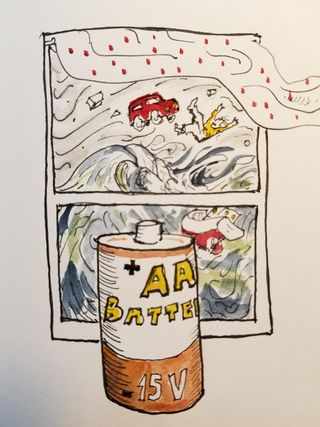Environment
Humans Can't Plan Long-Term, and Here's Why
Our brains are set up to opt for what's familiar and close.
Posted June 25, 2018

The human species is on the road to extinction--or is it? A recent book by Charles C. Mann outlines two opposing viewpoints: “wizards” believe a new “green revolution” will allow Earth to feed the close to 10 billion people who will crowd the planet by 2050, while the “prophets” foresee doom if humans don’t learn to downsize everything, from population to agriculture, by mid-century.
Both agree that Earth’s population, currently around 7.6 billion, will mushroom by 25 to 33 percent over the next thirty-odd years; and that the task of feeding so many people, even now, is not easy, and results in degradation of the planet’s environment.
What tends to make the “prophets’” case more compelling is the fact that humans are so poor at long-range planning—this despite the views of U Penn psychologist Martin Seligman, who argues that humans are the only primates able to plan ahead. He sees us as “homo prospectus,” the forward-looking ape, and argues that the best other species can do is look for the next banana, or mechanically stockpile nuts for winter, whereas people can imagine far into the future.
But concrete examples of actual, large-scale, effective human planning tend to focus on the short-term: variations on the fight-or-flight reflex. Our notorious inability as a species to significantly affect the long-term, man-made crises of population growth or climate change, not to mention the wars and crises that devolve from their effects, would seem to argue in the other direction. And the reason we are so poor at long-range planning might well lie in how our brains work.
I stumbled onto this issue because of hurricanes. After writing a book about a giant American merchant ship that vanished in Hurricane Joaquin, in 2015, taking all 33 of her crew with her, I started looking into both hurricanes and the measures we are taking to palliate or counter the effects of storms that, like Joaquin, are pumped up by global warming into meteorological monsters.
I found that we’re not doing much. Russel Honore, the general in charge of hurricane control following 2005's Hurricane Katrina, has said that efforts to protect New Orleans from the next major hurricane amount to “putting a Band Aid” on the problem in order to cope with “the last disaster.” A project known as the “Ike Dike,” that would build a levee of sorts to protect Houston from a repeat of the lethal flooding caused by last year’s Hurricane Harvey, has still not got off the ground. And the “Big U” plan that would build sea walls and other flood-control structures to keep downtown Manhattan from becoming a lake, as happened during “Superstorm” Sandy in 2012, has been downgraded to the point where its usefulness as a hurricane protection plan is close to nil.
All this is happening, or rather not-happening, at a time when forecasters agree that warmer sea temperatures and melting ice at the poles, all caused by thoughtless, runaway industrialization over the last century, will inevitably result in more frequent, more vicious, and deadlier storms.
So why do humans not plan better, when the lethal effects of hurricanes are so well known, when the political and economic consequences of such storms are unarguably so dire?
One reason might lie in the way the perception centers of our brains are structured. The fact is, we seem to spend at least as much time and effort looking for patterns we recognize as we do scanning for the unexpected and new. It seems the visual cortex of monkeys, for example, uses bandwidths of around 60 Hz to collect information; at the same time, it orders the brain to look for previously recognized shapes on frequencies of 10 to 20 Hz, according to research by Charles Gilbert of Rockefeller University. The same type of informational trade-off applies to the human auditory system, and almost certainly to the other senses as well.
Another reason for our reluctance to plan long-term has to do with “hyperbolic discounting,” a truism of behavioral economics associated in particular with psychologist George Ainslie. What researchers found was that humans consistently will tend to opt for immediate rewards instead of rewards down the pike, even if the later rewards are greater. For example, when offered $50 now instead of $100 in a month, most people will choose the fifty bucks. If you translate this syndrome into hurricane planning, we prefer buying flashlight batteries the next time we see a TV warning about a hurricane threatening our area with power cuts, versus investing money in levees and flood-control infrastructure that might well prevent the destruction of our house, and even our own death, five or ten years hence.
Hurricane season for 2018 is predicted to come in at roughly the same level of peril as last year’s; the 2017 season that brought us Hurricane Maria, whose effects, short-term and -long, caused close to 5,000 deaths in Puerto Rico. Yet President Donald Trump recently signed an order stripping from all federal infrastructure projects requirements for the kind of flood control that would deal with storm surge from stronger hurricanes.
Maybe it’s time to stock up on those flashlight batteries...




